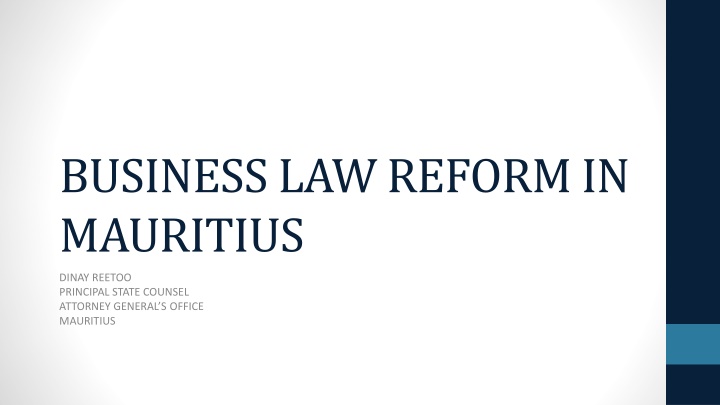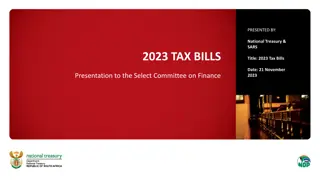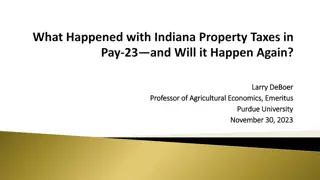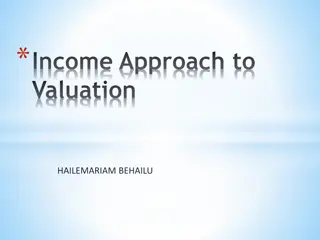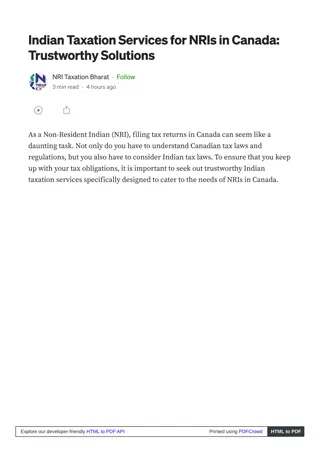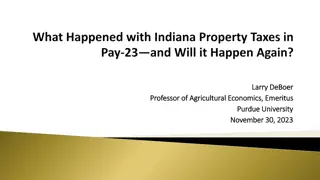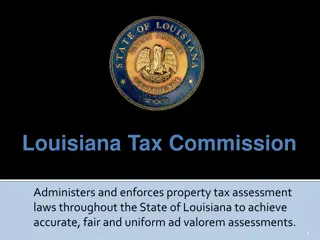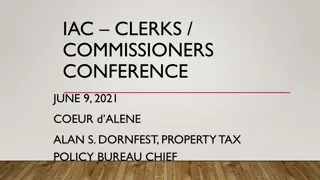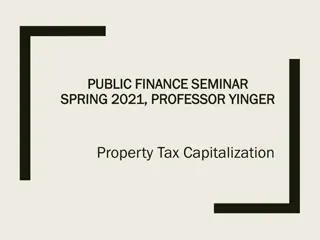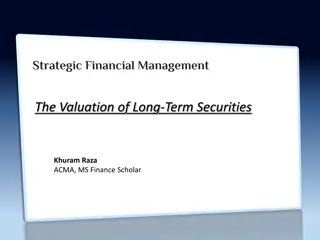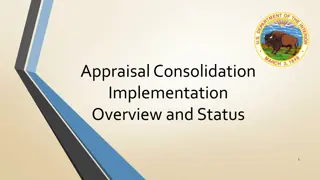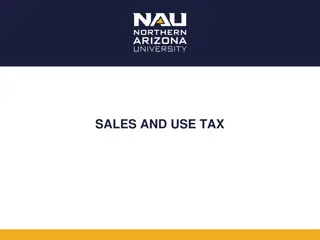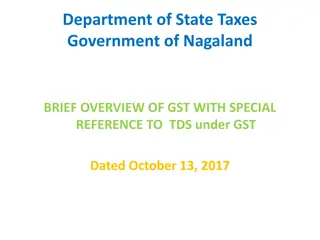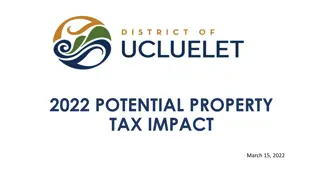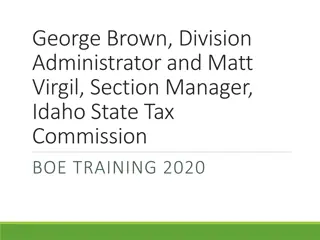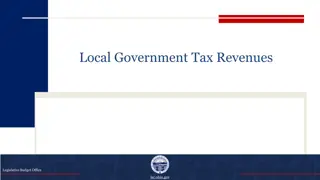Arizona Property Tax Assessment Valuation Amendment
Voter-approved amendments in Arizona's property tax system, including changes to Full Cash Value vs Limited Property Value, Prop 117's impact on property tax calculations, and the transition to utilizing LPV for taxes.
Download Presentation

Please find below an Image/Link to download the presentation.
The content on the website is provided AS IS for your information and personal use only. It may not be sold, licensed, or shared on other websites without obtaining consent from the author.If you encounter any issues during the download, it is possible that the publisher has removed the file from their server.
You are allowed to download the files provided on this website for personal or commercial use, subject to the condition that they are used lawfully. All files are the property of their respective owners.
The content on the website is provided AS IS for your information and personal use only. It may not be sold, licensed, or shared on other websites without obtaining consent from the author.
E N D
Presentation Transcript
BUSINESS LAW REFORM IN MAURITIUS DINAY REETOO PRINCIPAL STATE COUNSEL ATTORNEY GENERAL S OFFICE MAURITIUS
STRUCTURE OF THE PRESENTATION For the purposes of this presentation, Business Law Reform is construed as reforms connected to enhancing the business environment in Mauritius. The presentation will examine legislative changes which have contributed to the enhancement business facilitation in Mauritius and will also examine the contribution of the Law Reform Commission of Mauritius in the context of business law reform in Mauritius. LEGISLATIVE REFORMS: (A)FINANCE (MISCELLANEOUS Provisions) Act 2016 (Act No 18 of 2016) (B)BUSINESS FACILITATION (Miscellaneous Provisions) Act 2017 (Act No 4 of 2017) FORTHCOMING LEGISLATIVE/INSTITUTUONAL REFORMS: (A)BUDGET SPEECH (2017-2018)/ FINANCE (MISCELLANEOUS PROVISIONS) BILL 2017; (B)ECONOMIC DEVELOPMENT BOARD BILL 2017. CONTRIBUTION OF THE LAW REFORM COMMISSION TO BUSINESS LAW REFORM
Finance (Miscellaneous Provisions) Act 2016 The Building Control Act was amended to: (a) make provision for plans and drawings that support an application for permit with respect to a proposed construction work to be submitted electronically or such other technological means; and (b) reduce the time frame for the issue of a compliance certificate by a local authority from 10 to 5 working days from the date of application. The Business Registration Act was amended to enhance exchange of information and to provide for the Registrar of Companies to be able to issue business registration card electronically. The Financial Services Act was amended to provide for the setting up and administration of an online centralised Know Your Customer (KYC) database for the non-banking financial services sector.
Finance (Miscellaneous Provisions) Act 2016 Act No 18 of 2016 The Investment Promotion Act was amended to a) provide that the Investment Projects Fast-Track Committee may request the Board of Investment to issue the relevant permit, licence, authorisation or clearance for a business to start operation in cases where the statutory deadlines for processing of applications by the relevant public sector agencies have lapsed, and b) a new section was added on the Regulatory Sandbox Licence (RSL). The Licence will have to be applied to and issued by the BOI to operate innovative projects for which no legal provision has been made or where there are inadequate provisions in the relevant enactments.
The Regulatory Sandbox Licence Explained The Regulatory Sandbox Licence exists in countries like the UK, Singapore and Australia. These countries have applied the concept of a Regulatory Sandbox Licence (RSL) which allows companies to invest in innovative projects within an agreed set of terms and conditions, even in the absence of a formal licencing framework. This can be an effective mechanism to speed up strategic investments. The Board of Investment (BOI) has, by way of the Finance (Miscellaneous Provisions) Act 2016, been empowered to issue approvals, permits and licences to start an innovative project after consulting relevant ministries. Eligibility o Any investor who has an innovative project for which there exists no legal framework or adequate provisions which cover the materialization of his project may submit a duly filled in application for the issuance of an RSL. o The applicant should be able to demonstrate the innovative nature of the project at the local, regional or international level. Guidelines The Board of Investment has issued guidelines on the procedures to apply for the RSL.
BOI Guidelines In Relation to the RSL1 Generally, an applicant seeking the Board s approval to participate in a Sandbox must demonstrate: a) the product, service or solution is genuinely innovative, i.e. it is novel and not similar to those already available in the Mauritian, regional or international market; b) the project will contribute to the development of local skills and know-how; c) the provision of the new product, service or solution is otherwise i. not allowed due to any prohibition or restriction under existing laws or regulations administered by the country; or ii. either wholly or partly incompatible with applicable regulatory requirements currently imposed by the country; iii. However, in cases where the proposed product, service or solution possesses strong value propositions, the Board would adopt an open mind approach which includes granting flexibilities in complying with existing rules and regulations.
BOI Guidelines In Relation to the RSL2 d) the product, service or solution has clear potential to: i. contribute to the development of Mauritian economy. This may include greater accessibility, efficiency, security, reliability or effectiveness in the provision services and products in diverse sectors ii. bring about enhancement to the Mauritian industrial, commercial and know-how efficiency or risk management and controls; iii. significantly benefit the Mauritian consumers. e) the applicant has conducted an adequate and appropriate assessment to demonstrate the usefulness and functionality of the product, service or solution and understands the associated risks; f) the applicant has the necessary resources to participate in Sandbox, mitigate and control potential risks and losses arising from the offering of such product, service or solution;
BOI Guidelines In Relation to the RSL3 g) the applicant s business plan to deploy the product, service or solution on a commercial scale in Mauritius after exit from the Sandbox or to deploy the product, service or solution on a commercial scale for the international market with relevant advantages for Mauritius (sharing of Royalties, setting up of the company s Headquarters in Mauritius); h) the adequacy of safeguards, terms and conditions to mitigate major foreseeable risks assessed and mitigated and i) Any other criteria that would be deemed necessary to be met by the Board.
Safeguards in relation to the RSL1 The license will be accompanied by a number of conditions specific to the activity referring to: - Safeguards; - Terms and conditions that need to be followed; - Compliance with existing regulations referring to general business operation; - Monitoring mechanisms; - Others Applicants should beforehand identify the potential risks to consumers and the country s economy that may arise from the testing of the product, service or solution in the Sandbox and propose appropriate safeguards to address the identified risks. Where there are existing legal provisions for such types of activity, the applicant is encouraged to provide the necessary information.
Safeguards in relation to the RSL2 The BOI will on its end assess the proposed safeguards and may implement additional safeguards, terms and conditions as it may deem necessary. These may include, but are not limited to: 1. consumer protection; 2. limiting the duration of the testing period; 3. availability of consumer redress mechanism, including the possibility for financial compensation under clearly specified circumstances; 4. availability of adequate resources to undertake the testing, develop solutions to mitigate risks and contain the consequences of failure; 5. maintain appropriate risk management systems and processes including adequate confidentiality and security controls as well as contingency arrangements to address fraud and operational disruptions; .contd
Safeguards in relation to the RSL2 6. 7. Intellectual Property; certifying agreement of commercialization project so as not to use Sandbox cover to unfairly compete with existing companies; guaranteeing that experimental tests are conducted in restrained and secured areas; responsibility for losses are either taken by third party companies wishing to test the new products or the company proposing the project demonstration of skills transfer to locals In addition to the safeguards, the project should be carried out in accordance with all existing legislative arrangements. 8. 9. 10.
The Business Facilitation (Miscellaneous Provisions) Bill 2017 The Explanatory Memorandum to the Bill provided as follows: The object of this Bill is to provide for amendments to the legislative framework that are necessary for the removal of constraints in relation to permits, licences, authorisations and clearances to further facilitate the doing of business, and for related matters. The Bill focuses on seven main areas, namely - facilitating cross border trade; expediting the process to start a business; expediting the processing and issue of construction permits; facilitating the process to register property; improving the insolvency procedures; transferring the system of collection and enforcement of social charges from the Ministry responsible for the subject of social security to Mauritius Revenue Authority, and implementing an E-Licensing system to provide a single point of entry for applications for permits and licenses.
The Business Facilitation (Miscellaneous Provisions) Act 2017 The amendments which will be highlighted in relation to the Business Facilitation (Miscellaneous Provisions) Act 2017 pertain to the following enactments: a) Companies Act; b) Environment Protection Act c) Inscription of Privileges and Mortgages Act, the Notaries Act, Registration Duty Act, Sale of Immovable Property Act, and Transcription and Mortgage Act d) Investment Promotion Act e) Local Government Act f) Mauritius Standards Bureau Act g) Plant Protection Act
The Business Facilitation (Miscellaneous Provisions) Act 2017 The Companies Act was amended to provide - (i) the electronic issue of a certificate of incorporation; (ii) the removal of the obligation to use the seal of a company, and (iii) the reduction of the time frame for a person to file proof of the ground of objection with the Registrar with regard to the removal of a company from the Register, from 6 weeks to 2 weeks. The Environment Protection Act to: (i) reduce the time frame for the submission of an outline by a developer for a proposed undertaking from 3 months to 1 month; (ii) introduce a time frame of 2 weeks for the Director of Environment to impose, on the basis of an outline submitted, the terms of reference for a EIA report, and (iii) bring more clarity on the information requirement by making provision for guidelines.
The Business Facilitation (Miscellaneous Provisions) Act 2017 The Inscription of Privileges and Mortgages Act, the Notaries Act, Registration Duty Act, Sale of Immovable Property Act, and Transcription and Mortgage Act were amended to provide for a summary of the deed to be submitted in the Registration of Deeds and Documents System (RDDS). The RDDS is an electronic system that is operated by the Registrar-General for the secure transmission, registration and recording of deeds or documents. Further, the amendments to the Notaries Act also provide for a notary to deliver a certified copy or authenticated copy of a deed to a buyer within 8 days from the date of registration of the deed with the Registrar General.
The Business Facilitation (Miscellaneous Provisions) Act 2017 The Investment Promotion Act was amended to provided for the establishment of an e-licencing system at the BOI, for the online application, licences/permits/authorisations that are required to start and operate a business activity in Mauritius. processing and determination of The Local Government Act was amended to provide for businesses that do not require a Building and Land Use Permit or a regulatory licence to start operations immediately after registration of the business activity. The time frame for a local authority to issue an occupation certificate has, following the amendments, been reduced from 10 days to 5 days.
The Business Facilitation (Miscellaneous Provisions) Act 2017 The Mauritius Standards Bureau Act was amended to empower the Mauritius Standards Bureau (MSB) to give an electronic conformity report on the samples of articles, materials, substances that require examination, testing or analysis from the Bureau and no import permits will be required for these items. The Act also provides that an application and the issue of the electronic conformity report shall be made through the TradeNet System. The Plant Protection Act was amended to provide a time frame of 5 working days for the National Plant Protection Office (NPPO) to determine the issue of a plant import permit and for a single fee to be imposed.
Measures Announced in the Budget Speech 2017-2018 Some of the measures which qualify as Business Law Reform include, but are not limited to: a) creation of an Innovator Occupation Permit for innovative start-ups with a minimum operational expenditure of 20 per cent for Research &Development purposes. b) accelerated depreciation of 50 per cent per annum, in respect of capital expenditure incurred on R&D. c) allowing companies will be allowed to claim a double deduction in respect of qualifying expenditure on R&D. This will apply until income year 2021-2022. d) introducing an 8-year income tax holiday for new companies engaged in the manufacturing of pharmaceutical products, medical devices and high tech products. e) introducing the Innovation Box Regime for Intellectual Property assets which are developed in Mauritius. New companies involved in innovation-driven activities will benefit from a tax holiday of 8 years on the income derived from the totality of Intellectual Property Assets. f) amendments to the Code Civil Mauricien and the Code de Commerce to allow the use of all movable assets as loan collaterals.
The Economic Development Board Bill 2017 Paragraph 22 of the Budget Speech 2017-2018: We need to imperatively strengthen institutional capacity to support our growth objectives. To that end, an Economic Development Board (EDB) will be established to ensure greater coherence and effectiveness in implementing our policies and actions. The EDB will have three main directorates. The first directorate will be responsible for national and sectoral economic development planning. The second directorate will be in charge of investment and export promotion. The various functions of the existing promotion organisations, namely, the BOI, Enterprise Mauritius, the Financial Services Promotion Agency and the Mauritius Africa Fund will be integrated in the Economic Development Board. And the third directorate will manage the e- licensing business platform. The EDB will thus be the main business licensing agency in Mauritius no more office hopping to obtain a business license."
Contribution of the Law Reform Commission to Business Law Reform Reform of the Code de Commerce In the Issue Paper on Timeshare (Droits de Se jour a Temps Partage ) [July 2011], the economic nature of timeshare (and its potential for the development of the tourism industry) was examined. This is followed by an analysis of the legal techniques that could be used: the socie te d'attribution d'immeubles en jouissance a temps partage in France and the trust in the common law world. In the Report on Code de Commerce (Livre Premier) [fonds de commerce, garanties autonomes, cre dit documentaire, franchise, concession exclusive & timeshare] [May 2012], the Commission, after reviewing the provisions of the Code de Commerce, recommended the following changes to the Livre Premier: a) The addition, after Article 103, of a new Titre Sixie me Bis entitled De la Franchise [new Articles 104-1 to 104-99] ; b) The addition of a new Titre Sixie me Ter entitled De la Concession Exclusive [new Articles 105-1 to 105-65]; c) The addition, after Article 109, of a new Titre Septie me Bis entitled Du Fonds de Commerce [new Articles 109-1 to 109-56] ; d) The addition of a new Titre Huitie me , entitled De la jouissance a temps partage et du timeshare [new Articles 110 to 176] ; e) The addition of a new Titre Neuvie me entitled Des Garanties Autonomes [new Articles 177-1 to 177-23] ; f) The addition of a new Titre Dixie me entitled Du cre dit documentaire [new Articles 178-1 to 178-81].
Contribution of the Law Reform Commission.. to Business Law Reform The concept of fonds de commerce , which exists as far back as 1909, in France, is unknown in our law. In the context of the reform of the Code de Commerce, the usefulness of such a concept was examined and it was considered it would be appropriate to incorporate this concept in our law, with some adaptation, as it would ease the doing of business by facilitating access to credit. Since the release of the Issue Paper on Timeshare (Droits de Se jour a Temps Partage ) , the Commission, after consultation with stakeholders, formed the opinion that, given the peculiar features of our mixed legal system and the need to provide choice to operators, both legal techniques [ socie te d'attribution d'immeubles en jouissance a temps partage in France and the trust] could be incorporated in our law. The Commission has considered the proposed legal framework for timeshare would provide the enabling environment for this new economic activity to develop in the tourism sector. The Commission has been of opinion that with a view to ensuring fair trade - the Code should provide the statutory regime for the contracts of franchise and concession exclusive . The Commission has also considered that it would be useful to the business community and banks that the regime for garanties autonomes and cre dit documentaire be regulated by statute.
Contribution of the Law Reform Commission.. to Business Law Reform In the Report on Bail commercial [March 2015], the Commission, after taking into account that la reconnaissance le gale du fonds de commerce, qui consacre l existence juridique de l exploitation commerciale, doit ne cessairement impliquer une re glementation spe cifique du bail commercial, c est-a -dire de la location, par un commerc ant, de locaux immobiliers en vue de l installation de son fonds , suggested that a new Chapitre Sixie me on Bail commercial [new Articles 109-57 to 109-106] could be added to the proposed Titre Septie me Bis on Du Fonds de Commerce [recommended in the avant-projet of the 2012 Report on Code de Commerce (Livre Premier) In the Report on Interme diaires du commerce [December 2014], the Commission has reviewed the provisions of the Livre Premier of the Code de Commerce on Interme diaires du commerce and is of the opinion that changes can be effected. It is recommended that provision be made for the re glementation des activite s des principaux interme diaires du commerce ( les agents commerciaux, les agents d affaires et les courtiers ) and for la protection de leurs clients qui ne sont pas des professionnels de ces activite s : l information du client and le conseil au client In the Report on Incorporation of Provisions relating to Effets de Commerce (Lettre de Change & Billet a Ordre) in the Livre Premier of Code de Commerce [Nov 2012], the Commission considered the desirability of re- introducing in our law the concept of effets de commerce.
Contribution of the Law Reform Commission to Business Law Reform In the Paper on Legislative Framework for the Regulation of the Activities of Real Estate Agents [February 2016], the Commission recommended that the regulation of the activities of estate agents could be done either by the adoption of a new statute [the Real Estates Agents Act] or through an amendment to the Code de Commerce. The Real Estate Agents Bill is modelled on the New Zealand Real Estate Agents Act of 2008, whereas the amendment to the Code de Commerce is inspired by the French Loi no. 70-9 du 2 janvier 1970 re glementant les conditions d exercice des activite s relatives a certaines operations portant sur les immeubles et les fonds de commerce .
Contribution of The Law Reform Commission to Business Law Reform In the Report on Review of Aspects of Consumer Protection Law and Proposals for Reform [October 2010], the Commission after reviewing, from an international and comparative perspective, aspects of consumer law - the Consumer Protection Act; the Consumer Protection (Price and Supplies Control) Act; the Essential Commodities Act; the Fair Trading Act; the Hire Purchase and Credit Sale Act; and the Prices & Consumer Protection Advisory Committee Act considered that the current framework is inadequate. The provisions as to consumer guarantees in respect of supply of goods and services, as to unfair business practices, are insufficient. There is no provision as to unfair contract terms in consumer agreements. Safety requirements are laid down only in respect of goods. Distance selling, doorstep selling and unsolicited consumer transactions are not regulated. The enforcement framework relating to consumer transactions and agreements needs to be strengthened. The Commission was of opinion that a new Consumer Protection Regime should be put in place. The overall objectives of the new legislation should be to promote and advance the social and economic welfare of consumers by establishing a legal framework for the achievement and maintenance of a consumer market that is accessible, fair, efficient, responsible and sustainable for the benefit of consumers generally, and which provides adequate safeguards to vulnerable consumers.
Contribution of The Law Reform Commission to Business Law Reform To that end, legislation needs to be introduced which should make provision for: (a) Consumer rights, including the freedom of consumers to associate and form groups to advocate and promote their common interests; (b) Standards of consumer information so as to ensure that consumers are sufficiently well informed to benefit from and stimulate effective competition; (c) Consumer guarantees in respect of the supply of goods and services; (d) The protection of consumers from hazards to their well-being and safety, and product liability; (e) The prohibition of unfair terms in consumer contracts; (f) The prohibition of unfair business practices; (g) The regulation of distance selling, doorstep selling and unsolicited consumer transactions; (h) The regulation of consumer credit; (i) The establishment and operation of a National Consumer Council, which would encourage consumer participation in decision-making processes concerning the marketplace and the interests of consumers; (j) An effective enforcement framework relating to consumer transactions and agreements; and (k) An accessible, effective and efficient system of redress for consumers, including a mechanism for consensual resolution of disputes arising from consumer transactions.
Contribution of The Law Reform Commission to Business Law Reform In the Report on Mediation and Conciliation in Commercial Matters [November 2010], the Commission examined the concept of mediation and conciliation , which is used for the resolution of employment relations disputes, and has considered its application in furtherance of Government Business Facilitation Strategy - for the resolution of commercial disputes. The Commission reviewed developments of this aspect of the law in other jurisdictions, research work carried out by other law reform agencies, as well as the norms evolved by the United Nations Commission on International Trade Law [UNCITRAL]. The main objectives and principles of Alternative dispute resolution [ADR] in connection with mediation and conciliation in commercial matters The Commission acknowledged that ADR has become increasingly topical in the international business community. There is a world-wide trend for parties to turn to one of the processes of ADR, such as mediation and conciliation, when they feel that resolution of their disputes should, for various reasons, be sought outside the constraints of proceedings before national courts, and in a procedure which is the most informal possible. ADR processes, such as mediation and conciliation, provide an opportunity for parties in a commercial dispute to consider and resolve all dimensions of the dispute in a private and confidential environment which also preserves good business relations. The Commission has been of the view that parties involved in commercial disputes should be encouraged to explore whether their dispute can be resolved by agreement, whether directly or with the help of a third party mediator or conciliator, rather than by proceeding to a formal winner v. loser decision by a court. Parties should be encouraged to have recourse to Mediation Clauses in Contracts for the Settlement of Commercial Disputes. It has also been considered that it is in the interest of the nation that legislation be adopted, now that Mauritius has opened up to international law firms and the foundation has been laid for it to act as a jurisdiction of choice in the field of international arbitration, which would enable the country to emerge both as an International Arbitration and Mediation Centre for international commercial disputes. The UNCITRAL Model Law on International Commercial Conciliation (2002) could be incorporated in our law. A system of training and accreditation of arbitrators and mediators/conciliators should be put in place, as well as ethical standards laid down. were also considered.
